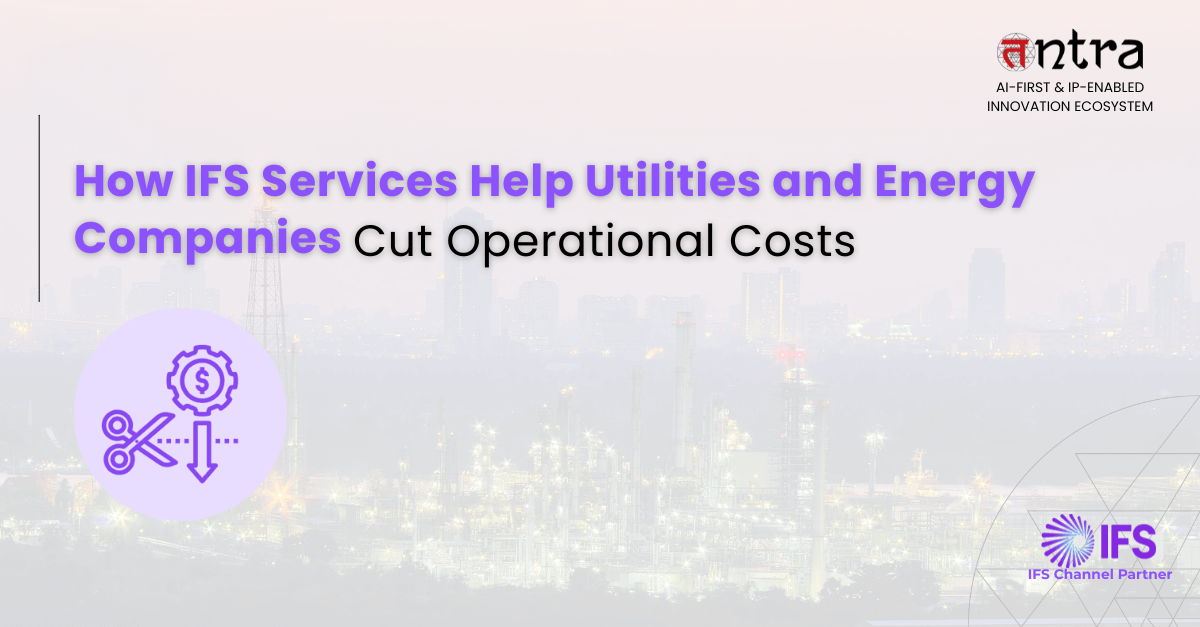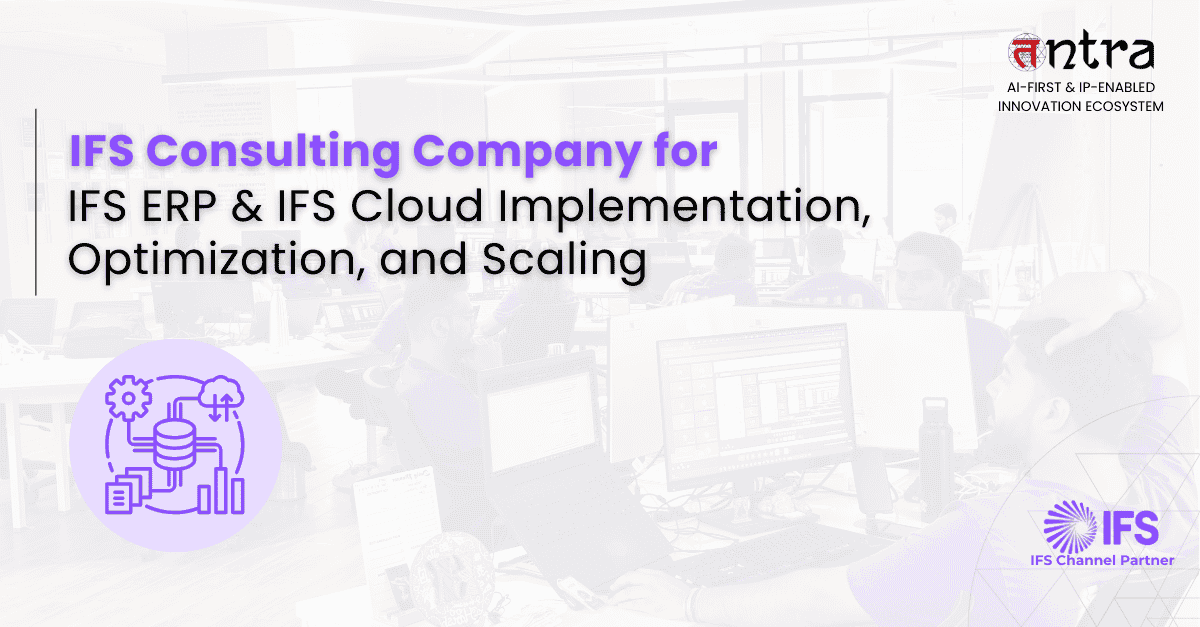
How IFS Services Help Utilities and Energy Companies Cut Operational Costs
Table of Contents
ToggleIFS Services help utilities and energy companies significantly reduce operational costs through smarter asset management, predictive maintenance, and efficient field service operations. With integrated solutions like IFS Cloud for Utilities, IFS ERP for Energy Sector, and IFS Field Service Management, organizations gain visibility, streamline processes, and eliminate inefficiencies. These tools enable better resource utilization, reduced downtime, and optimized energy operations, ultimately driving sustainable cost savings and improved performance across the utilities and energy value chain. Continue reading to learn more.
In the world of utilities and energy companies, the pressure to cut costs is relentless. Whether it’s a power-generation firm, a transmission & distribution utility, or an upstream oil & gas operation, operational inefficiencies, ageing assets, regulatory burdens and shifting business models all add up to rising costs.
That’s exactly where the suite of solutions from IFS comes into play, solutions like IFS Services for Utilities, IFS for Energy Companies, IFS Cloud for Utilities, IFS Energy and Utilities Solutions, and IFS ERP for Energy Sector are designed to help organizations in these asset-heavy industries rethink how they manage operations, assets and service delivery.
In this article we’ll walk you through how IFS helps utilities reduce operational costs, with real reference to the modules like IFS Asset Management, IFS Field Service Management, IFS Cloud Services, IFS Energy Operations, and why cost optimization using such software is no longer optional.
Why Cost Optimization Matters for Utilities & Energy Companies
Utilities and energy companies face mounting pressure to maintain profitability amid high operational costs and complex compliance requirements. Whether it’s a power-generation firm or an oil & gas enterprise, challenges like aging assets and rising maintenance costs drive the need for IFS cost optimization solutions.
Improving operational efficiency with IFS allows these companies to streamline workflows, reduce waste, and enhance visibility across departments. IFS solutions for energy management provide utilities with actionable insights that drive better performance and energy savings.
The Integrated Platform Advantage
One major benefit of IFS Energy and Utilities Solutions is the integration of multiple enterprise functions—ERP, EAM, and FSM—under one platform. Through IFS ERP for Energy Sector, IFS Asset Management, and IFS Field Service Management, companies can unify asset data, financials, and workforce operations.
This integrated enterprise service management software ecosystem minimizes silos, enhances coordination, and drives productivity. It also supports IFS ESM setup and configuration services, enabling a seamless implementation of enterprise service management systems that help businesses scale efficiently.
Managing Assets Better with IFS Asset Management
Assets like power stations, substations, pipelines, and turbines are central to utility operations. IFS Asset Management provides deep lifecycle visibility, helping companies manage maintenance schedules, costs, and asset utilization.
Through IFS Energy and Utilities Solutions and IFS software for power and utilities, businesses can perform predictive maintenance with IFS Cloud, reduce downtime, and extend asset lifespans.
The result: IFS asset lifecycle management for utilities that lowers unplanned outages and boosts ROI.
Field Service and Workforce Optimization with IFS Field Service Management
Field operations form the backbone of every energy and utility company. With IFS Field Service Management, utilities can automate scheduling, dispatch, and asset-tracking while ensuring technicians reach the right sites at the right time.
This IFS field service automation for energy companies reduces manual work and idle time while increasing service accuracy. When integrated with IFS Cloud Services, it becomes part of a complete enterprise service management solution that drives workforce efficiency and reduces costs.
Why Cloud Matters: IFS Cloud for Utilities & Energy
Cloud computing is transforming how energy companies operate. IFS Cloud for Utilities and IFS Cloud for oil and gas industry enable faster deployment, improved scalability, and reduced infrastructure costs.
Migrating to IFS Cloud Services means lower IT overheads, simplified updates, and greater data security. It’s a cornerstone of IFS cost optimization—helping organizations modernize operations without large capital expenditure.
Cloud-based deployment also strengthens IFS Energy Operations, enabling real-time monitoring, performance tracking, and operational intelligence.
Discover why IFS ERP Cloud matters for scalability and efficiency in utilities.
Predictive Maintenance: A Key Driver of Cost Optimization
Predictive maintenance with IFS Cloud is redefining cost control in utilities and energy companies. By using advanced analytics and IFS software for power and utilities, organizations can detect potential failures early and schedule repairs proactively.
This predictive capability, powered by IFS Energy Operations, minimizes downtime, avoids emergency repairs, and extends equipment life. Ultimately, it transforms reactive maintenance into a strategic cost-saving advantage.
Project and Distribution Efficiency: Addressing the Bigger Picture
The IFS ERP for Energy Sector supports large-scale infrastructure projects, renewable energy development, and supply chain coordination. IFS Cloud for Utilities integrates project planning, execution, and resource allocation—ensuring every asset, project, and resource is tracked efficiently.
This level of integration is what makes IFS enterprise service management solutions so powerful. It empowers companies to deliver projects on time and within budget, aligning operations with business strategy.
Customer Service, Utilities, and Service Excellence
Delivering reliable service while managing costs is critical for utilities. IFS Field Service Management and enterprise service management software help automate customer workflows—from job creation to billing and feedback.
By leveraging IFS Services for Utilities, companies can deliver higher service quality, faster response times, and greater customer satisfaction—all while reducing operational overhead.
The Overall Cost-Optimization Equation
Implementing IFS solutions for energy management results in measurable improvements across operations:
- Reduced downtime through predictive maintenance with IFS Cloud Services
- Lower asset maintenance costs with IFS Asset Management
- Increased productivity through IFS Field Service Management
- Reduced IT costs using IFS Cloud for Utilities
- Enhanced visibility with IFS Energy and Utilities Solutions
- Streamlined workflows via enterprise service management systems
Together, these benefits lead to improved asset reliability, workforce efficiency, and energy savings—helping organizations achieve long-term operational excellence.
Key Implementation Considerations
For maximum return on investment, companies should approach IFS ESM setup and configuration services strategically:
- Assess where your largest cost leaks occur.
- Map field operations and maintenance areas with IFS enterprise service management tools.
- Choose between IFS Cloud for oil and gas industry or hybrid options.
- Integrate IFS Asset Management and IFS Field Service Management modules for cross-functional efficiency.
- Train employees to adapt to new ESM software and workflows.
- Continuously track KPIs like downtime, cost savings, and service quality.
These steps ensure sustainable adoption of IFS enterprise service management solutions and long-term cost efficiency.
Learn how a strategic IFS implementation supports innovation and maximizes ROI
Conclusion
In an era of tighter budgets and increasing demand, IFS for Energy Companies and IFS Services for Utilities empower organizations to modernize, optimize, and reduce costs.
In this era of tighter margins, greater regulatory scrutiny and high customer expectations, utilities and energy companies cannot afford inefficiencies. Thankfully, with solutions like IFS Services for Utilities, IFS for Energy Companies, and IFS Cloud Services, the path to operational cost-optimization is in reach. By weaving together IFS ERP for Energy Sector, IFS Asset Management, IFS Field Service Management, and predictive-maintenance capabilities like Predictive maintenance with IFS Cloud, organizations can gain end-to-end visibility, smarter operations and leaner cost structures.
To explore how IFS Cloud can transform your enterprise, read our insights on Why IFS ERP Cloud Matters and IFS FSM Software for Field Service Automation: Reducing Costs and Downtime.
As a Trusted IFS Channel Partner, Tntra helps energy and utilities companies unlock new levels of efficiency through tailored IFS implementations designed for real-world impact.
Integrate IFS today and experience real benefits. Schedule a call!
FAQs
How does IFS help utilities and energy companies reduce operational costs?
IFS helps utilities and energy companies cut costs by integrating asset management, field service automation, and enterprise service management in one platform. It improves decision-making, minimizes downtime, and enhances resource utilization for measurable cost savings.
What are the key IFS solutions for the utilities and energy sector?
Key IFS solutions include IFS Cloud for Utilities, IFS ERP for Energy Sector, IFS Asset Management, and IFS Field Service Management. These modules streamline operations, increase transparency, and enable IFS cost optimization across the value chain.
How does IFS improve asset management in energy companies?
IFS Asset Management and IFS Energy and Utilities Solutions provide real-time asset visibility, lifecycle tracking, and predictive analytics. This helps reduce failures, extend asset life, and lower repair costs.
What role does predictive maintenance play in cost savings with IFS Cloud?
Predictive maintenance with IFS Cloud enables proactive repairs before failures occur. This reduces downtime, limits emergency interventions, and extends equipment life—all key to cost efficiency.
How can IFS Field Service Management optimize workforce efficiency?
IFS Field Service Management enhances technician dispatching, job tracking, and resource allocation. It ensures the right workforce reaches the right location at the right time, improving productivity and cutting service costs.
How does IFS support sustainability and energy efficiency initiatives?
IFS for sustainable energy management integrates data-driven insights that help organizations reduce energy waste, optimize resource consumption, and align with green regulations for a cleaner future.
Why should energy companies invest in IFS Cloud now?
Investing in IFS Cloud for Utilities or IFS Cloud for oil and gas industry provides scalability, automation, and predictive intelligence that help energy companies stay competitive while reducing operational and IT costs.
 Download IFS Guide
Download IFS Guide




